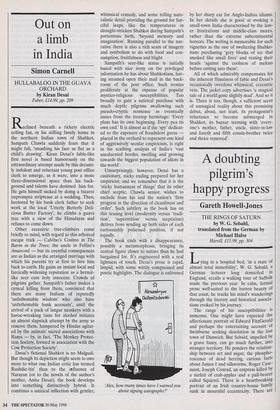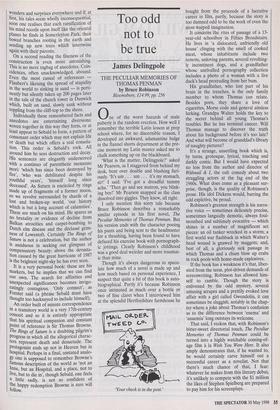A doubting pilgrim's happy progress
Gareth Howell-Jones
THE RINGS OF SATURN by W. G. Sebald, translated from the German by Michael Hulse Harvill, £15.99, pp. 304 Lying in a hospital bed, 'in a state of almost total immobility', W. G. Sebald, a German lecturer long domiciled in England, recalls a walking tour of Suffolk made the previous year. In calm, formal prose well-suited to the barren beauty of that coast, he tracks his mind's wanderings through the literary and historical associa- tions evoked by his journey. The range of his susceptibilities is immense. One might have expected the affectionate portrait of Edward FitzGerald and perhaps the entertaining account of Swinburne seeking desolation in the lost town of Dunwich. But Sebald, impelled by a grave fancy, can go much further, into stranger territory. He ponders the relation- ship between art and sugar, the phospho- rescence of dead herring, curious facts about James I and silkworms, Roger Case- ment, Joseph Conrad, an empress killed by a surfeit of crab-apples and a pall-bearer called Squirrel. There is a heartbreaking portrait of an Irish country-house family sunk in mournful eccentricity. There are wonders and surprises everywhere and if, at first, his tales seem wholly inconsequential, soon one realises that each ramification of his mind recoils upon itself like the oriental Planes he finds in Somerleyton Park, their bowed branches rooting in the earth and sending up new trees which intertwine again with their parents. On a second reading the fineness of the construction is even more astonishing. This is no mere ragbag of anecdotes. Coin- cidences, often unacknowledged, abound. Even the most casual of references — F. laubert's likening the spread of stupidity in the world to sinking in sand — is perti- nently but silently taken up 200 pages later in the tale of the church tower in Dunwich which, built on sand, slowly sank without toppling from the cliff-top to the shore. Individually these remembered facts and anecdotes are entertaining diversions: woven together in this way they form, or at least appear to Sebald to form, a pattern of consonant order which may not explain life or death but which offers a real consola- tion. This order is Sebald's rock. All around him he sees destruction and decay. His sentences are elegantly underscored with a continuo of parenthetic memento !ph: 'which has since been destroyed by fire', 'who was debilitated despite his Youthful years', 'himself long since deceased'. As Saturn is encircled by rings made up of fragments of a former moon, so we revolve surrounded by shards of a lost and broken-up world, 'our history which is but a long account of calamities'. These are much on his mind. He spares us no brutality or evidence of decline from Balkan atrocities and carpet-bombing to Dutch elm disease and the déclassé grim- ness of Lowestoft. Certainly The Rings of Saturn is not a celebration, but the author is assiduous in seeking out glimpses of compensatory beauty: above the devasta- tion caused by the great hurricane of 1987 is the brightest night-sky he has ever seen. It is a very personal book: these are his markers, but he implies that we can find our own. The search for affinities and unexpected significances becomes invigo- ratingly contagious. 'Only connect', as Forster said (a phrase Sebald must have thought too hackneyed to include himself). An order built of minute correspondence In a transitory world is a very 17th-century conceit and so it is entirely appropriate that his spiritual companion and constant Point of reference is Sir Thomas Browne. The Rings of Saturn is a doubting pilgrim's progress in which all the allegorical charac- ters represent death and desuetude. The Protagonist ends up not in Heaven but in hospital. Perhaps in a final, unstated analo- gy one is supposed to remember Browne's famous description of the world as 'not an Inne, but an Hospital, and a place, not to live, but to die in', though Sebald, one feels a little sadly, is not so confident of the happy redemption Browne is sure will follow.



































































 Previous page
Previous page